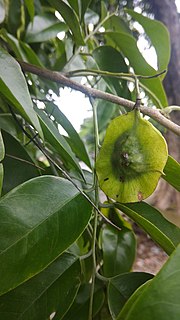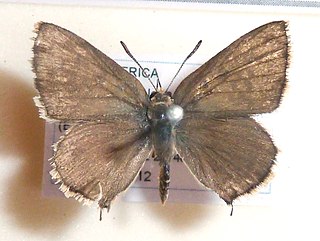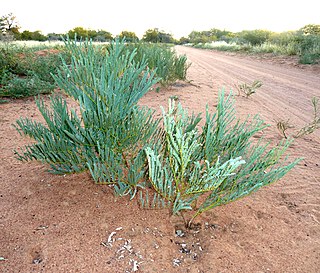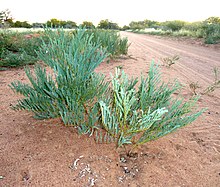
An assault is the act of inflicting physical harm or unwanted physical contact upon a person or, in some specific legal definitions, a threat or attempt to commit such an action. It is both a crime and a tort and, therefore, may result in criminal prosecution, civil liability, or both. Generally, the common law definition is the same in criminal and tort law.

The AGM-88 HARM is a tactical, air-to-surface anti-radiation missile designed to home in on electronic transmissions coming from surface-to-air radar systems. It was originally developed by Texas Instruments as a replacement for the AGM-45 Shrike and AGM-78 Standard ARM system. Production was later taken over by Raytheon Corporation when it purchased the defense production business of Texas Instruments.
Robbery is the crime of taking or attempting to take anything of value by force, threat of force, or by putting the victim in fear. According to common law, robbery is defined as taking the property of another, with the intent to permanently deprive the person of that property, by means of force or fear; that is, it is a larceny or theft accomplished by an assault. Precise definitions of the offence may vary between jurisdictions. Robbery is differentiated from other forms of theft by its inherently violent nature ; whereas many lesser forms of theft are punished as misdemeanors, robbery is always a felony in jurisdictions that distinguish between the two. Under English law, most forms of theft are triable either way, whereas robbery is triable only on indictment. The word "rob" came via French from Late Latin words of Germanic origin, from Common Germanic raub "theft".

The Mimosoideae are a clade of trees, herbs, lianas, and shrubs in the pea family (Fabaceae) that mostly grow in tropical and subtropical climates. They are typically characterized by having radially symmetric flowers, with petals that are twice divided (valvate) in bud and with numerous showy, prominent stamens. The clade comprises about 40 genera and 2,500 species.

Pterocarpus is a pantropical genus of trees in the family Fabaceae. It belongs to the subfamily Faboideae, and was recently assigned to the informal monophyletic Pterocarpus clade within the Dalbergieae. Most species of Pterocarpus yield valuable timber traded as padauk ; other common names are mukwa or narra. P. santalinus also yields the most precious red sandalwood in China known as Zitan. The wood from the narra tree and the Burmese padauk tree is marketed as amboyna when it has grown in the burl form. The scientific name is Latinized Ancient Greek and means "wing fruit", referring to the unusual shape of the seed pods in this genus.

Self-harm or self-injury is intentional behaviour that is considered harmful to oneself. This is most commonly regarded as direct injury of one's own skin tissues usually without a suicidal intention. Other terms such as cutting and self-mutilation have been used for any self-harming behavior regardless of suicidal intent. The most common form of self-harm is using a sharp object to cut the skin. Other forms include scratching, hitting, or burning body parts. While earlier usage included interfering with wound healing, excessive skin-picking, hair-pulling, and the ingestion of toxins, current usage distinguishes these behaviors from self-harm. Likewise, tissue damage from drug abuse or eating disorders is not considered self-harm because it is ordinarily an unintended side-effect.
In moral philosophy, deontological ethics or deontology is the normative ethical theory that the morality of an action should be based on whether that action itself is right or wrong under a series of rules, rather than based on the consequences of the action. It is sometimes described as duty-, obligation-, or rule-based ethics. Deontological ethics is commonly contrasted to consequentialism, virtue ethics, and pragmatic ethics. In this terminology, action is more important than the consequences.

Prosopis is a genus of flowering plants in the family Fabaceae. It contains around 45 species of spiny trees and shrubs found in subtropical and tropical regions of the Americas, Africa, Western Asia, and South Asia. They often thrive in arid soil and are resistant to drought, on occasion developing extremely deep root systems. Their wood is usually hard, dense and durable. Their fruits are pods and may contain large amounts of sugar. The generic name means "burdock" in late Latin and originated in the Greek language.

Sarah Harmer is a Canadian singer, songwriter and environmental activist.
The harm principle holds that the actions of individuals should only be limited to prevent harm to other individuals. John Stuart Mill articulated this principle in On Liberty, where he argued that "The only purpose for which power can be rightfully exercised over any member of a civilized community, against his will, is to prevent harm to others." An equivalent was earlier stated in France's Declaration of the Rights of Man and of the Citizen of 1789 as, "Liberty consists in the freedom to do everything which injures no one else; hence the exercise of the natural rights of each man has no limits except those which assure to the other members of the society the enjoyment of the same rights. These limits can only be determined by law."
Tobacco harm reduction (THR) is a public health strategy to lower the health risks to individuals and wider society associated with using tobacco products. It is an example of the concept of harm reduction, a strategy for dealing with the use of drugs. Tobacco smoking is widely acknowledged as a leading cause of illness and death, and reducing smoking is vital to public health.
The alcohol industry is the segment of the commercial drink industry that is involved in the manufacturing, distribution, and sale of alcoholic beverages.

Crudaria leroma, the silver-spotted grey, is a butterfly of the family Lycaenidae. It is found in south-western Africa, including Zimbabwe, Mozambique, Botswana and South Africa. In South Africa, it is found from the Western to the Eastern and Northern Cape, KwaZulu-Natal, the Free State, Mpumalanga, Limpopo, North West and Gauteng provinces.

Gynanisa maja, the speckled emperor or chipumi, is a moth of the family Saturniidae. The species was first described by Johann Christoph Friedrich Klug in 1836. It is known from South Africa to eastern Africa. Gynanisa nigra is just a darker form and not a distinct species.

Elephantorrhiza elephantina, commonly known as the eland's wattle or elephant's root, is a subshrub in the mimosoid clade of legumes. They occur widely and in several bioregions of southern Africa. Considerable size variation has been noted, and polyploidy was suspected.

Elephantorrhiza burkei, commonly known as the elephant root or sumach bean, is a deciduous shrub or small tree in the mimosoid clade of legumes. It is native to southern Africa, where it is found on rocky slopes or ridges, in either woodland, grassland or scrubland. The species is named after the botanist Joseph Burke.
Elephantorrhiza suffruticosa, commonly known as the skew-leaved elephant-root, is a species of flowering plant in the family Fabaceae. It is a deciduous, multi-stemmed shrub or rarely a tree of 4 to 8 meters tall, which may be found on hills as well as plains. The type material was obtained south of Humbe, Angola. E. rangei of southern Namibia is now considered a synonym.

The 1974 California lieutenant gubernatorial election was held on November 5, 1974. Democratic nominee Mervyn Dymally narrowly defeated Republican incumbent John L. Harmer with 49.19% of the vote.












